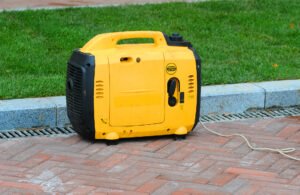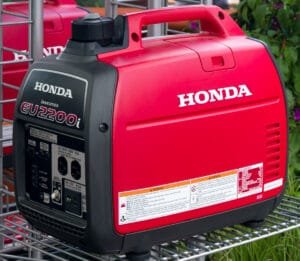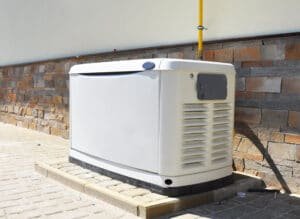The first generator ever invented was by British scientist Michael Faraday all the way back in 1831. Since the first electric generator was invented they can be found pretty much everywhere: A back-up generator for when your power goes out at your house, in your vehicle in the form of an alternator, and nearly all of the electricity for power grids (Think wind turbines, gas turbines, and hydro turbines) around the world.
This article will focus on home generators and help you decide which one may be the best generator for you based on a variety of options.
Types of Home Generators
When choosing a generator for your home there are a number of things you should determine to ensure that you get the type and size of generator you need for your situation. There are three main types of generators that homeowners buy:
Portable Generators

The main appeal of a portable generator is that it is, well, portable! Buying a portable generator would be a great option if you don’t experience many power outages or if you happen to go camping a lot. This type of generator runs off of either gasoline or diesel and is strong enough to provide electric to power tools, refrigerators, and even electronics such as a television by plugging these directly into the generator.
Maintenance for a portable generator is much like a lawn mower, or on a bigger scale, a motor vehicle. Since these run off of gas/diesel there are steps to preserve the life of your generator. For instance, just like a car you must regularly change your motor oil, air filter, and if you are going to be storing your generator for a long time to have a full tank of fuel.
Major drawbacks would include a lot of wasted fuel while being quite loud and depending on what you would need it for those issues could be a major downfall. The problem with portable generators is that they run at full capacity at all times – simply meaning if you are only charging your phone from the generator there is not throttle to control electrical output which means a lot of wasted energy($$$). Due to this reason, they are a bit louder when they are running like a lawn mower, string trimmer (weed wacker), or a chainsaw.
Inverter Generators

Think of the inverter generator as the portable generator’s not so distant cousin. Similar in many ways, the inverter generator is becoming a more popular option due to lower fuel consumption and being much quieter at times. These generators are much smaller and lighter, typically ranging from forty to sixty pounds based on wattage. Perfect use cases typically involve traversing the outdoors such as fishing, hunting, camping, but is also used a lot in construction.
Caring for your inverter generator is almost identical to the common portable generator. The major difference is that you will notice that you are not fueling up as much with this type of generator. Inverter generators have the ability to control power output unlike the portable generator meaning less wasted energy and a much quieter experience. Excellent for construction work and late night/early morning use, as these generators run at the same volume as your typical in person conversation.
It may seem the inverter generator is superior to the portable generator in every way, but that is not always the case depending on your needs. Your typical inverter generator is not going to be enough to power all of your household items due to the smaller size. While you can purchase a bigger size to accommodate more of your needs – they can often reach up to five times the cost of your typical portable generator. The max energy output of the biggest inverter generator (Usually around 4,000 Watts) is generally where the common portable generator starts out at for a fraction of the price.
Home Standby Generators

The king of home generators is known as a standby generator, or simply, a whole-house generator. These generators are permanently installed at one location and they are power by either natural gas or liquid propane. Standby generators, given that you purchase the correct size for your home, will be able to provide a full electrical back-up within seconds of you losing your primary power source. Excellent for homeowners who experience high winds, heavy rain and snow, or living in rural forested areas – Basically anyone battling Mother Nature on a consistent basis.
The maintenance for your standby generator is no different than the other varieties of generators above. Oil changes, air filters, and spark plugs all need changed on a regular basis. One major difference for this type of generator is that the company you choose to purchase from will typically offer some type of maintenance schedule on a yearly basis. Since these generators run off of natural gas/liquid propane you generally do not have to worry about fueling standby generators yourself – it is automatically connected to the generator on and fuels on an as needed basis.
With size and power comes a larger price tag. Other than lacking portability, the standby generator is by far the most expensive option out of the three major types of generators by up to ten times the amount of the biggest inverter generators.
Top Brands of Home Generators
Once you have decided which type of generator is the right choice for you it is time to decide which brands are the absolute best at getting the job done.
Best Portable Generator Brands
Typically priced between $200-$2000 depending on what size you need, there are a few top brands that make portable generators at all levels:
- Westinghouse
- WEN
- Champion
- Generac
- Honda
While these are not the only brands that make portable generators, they consistently rank as the top brands.
Best Inverter Generator Brands
Inverter Generators will run from between $400-$2000, but while the prices are similar to the portable generators, just keep in mind that these prices are for generators with a fraction of output.
- Westinghouse
- Wen
- Champion
- Honda
Best Home Standby Generator Brands
Home Standby Generators can power your whole home, but that comes with a substantial price increase from the other categories. Standby Generators start at around $5,000 for a smaller house, but these require installation which generally looks like a total cost of $15,000 all the way up to $30,000.
Two brands that dominate this space are Generac and Briggs & Stratton.
Electric generators are excellent to keep your fridge running in a pinch, allow you to continue life as normal during a black out, or even enhance your camping experience by allowing you to charge your phone or turn on a small light. Whether you are camping or live in an area that has frequent outages, there are plenty of options for you to choose from so that you get the most out of your generator.
Related: Honda Generators
More information on Honda generators. Read more about the basics of buying a generator as well as what the best generator brands are.Mark is a senior editor and retail/deals enthusiast at TheDealExperts.com. He specializes in finding the best deals available in-store and online. In his spare time, mark enjoys taking his pups on hikes, camping, fishing and getting on the road.
